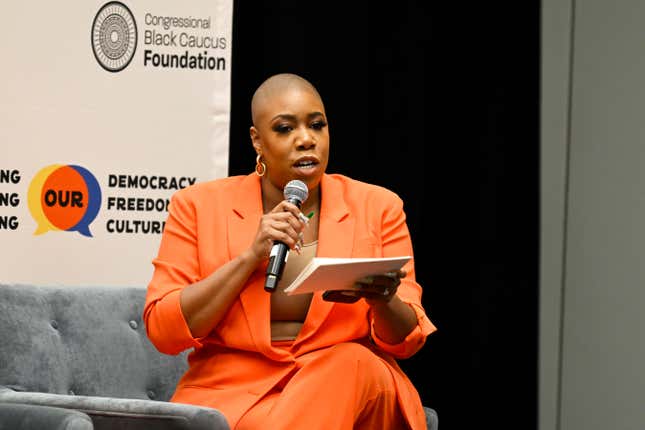
As the Presidential race continues to heat up, a growing grassroots political movement has increasingly taken center stage. Hundreds of thousands of Americans have hit the streets to call for a permanent ceasefire in the Gaza Strip — with Black political leaders including Representatives Cori Bush (D-MO), Ayanna Pressley (D-MA), and Summer Lee (D-PA) among those leading the charge.
In Michigan and Minnesota, an insurgent “uncommitted vote” in the Democratic primary led by voters protesting President Joe Biden’s backing of Israel was massively successful. But does this issue truly spell trouble for Biden when it comes to minority voters, including a large swath of Black voters who are sympathetic to the plight of Palestinians?
For the 411, The Root sat down with Symone Sanders-Townsend, host of MSNBC’s “The Weekend” and former advisor to President Joe Biden and Vice President Kamala Harris. Sanders-Townsend said the administration shouldn’t underestimate these types of movements, making comparisons to the way some candidates failed to properly address (to their detriment) the Black Lives Matter movement in 2016.
“I know for a fact that least a couple months ago and weeks ago, people were telling Joe Biden, the President of the United States of America, that this ceasefire thing was going to blow over once you get the hostages back and won’t be an issue for the general election,” shared Sanders-Townsend. “I think that was wrong and bad advice to give.”
Sanders-Townsend, who previously served as National Press Secretary for Bernie Sanders in 2016, said that what we’re seeing in the streets now is very similar to the impact of Black Lives Matter two cycles ago. “This moment is similar to 2016 when we had an earnest and forward-facing conversation for the first time in a while about police brutality and the rise of the Black Lives Matter and after the death of [Michael Brown],” she said.
Sanders-Townsend says while it’s not an identical movement, there are key political parallels. “I’m not saying the issues are the same, but I’m saying it’s a similar climate,” she said. “Just like how the issue of what we’re calling Black Lives Matter sustained itself as an issue and a topic of concern that was on the mind of voters throughout the election, on top of other things.”
People are watching these images out of Gaza and seeing the death toll for themselves, said Sanders-Townsend. “And it is like, this is not right. What is happening to these people, to these children, and why is the United States government doing this, and I think the administration and the campaign, they have to not be afraid to give a good answer” she said.
Sanders-Townsend isn’t the first person to note these parallels. The Root spoke with Rep. Bush (D-MO), who rose to prominence as a Black Lives Matter activist, about why she’d called for a ceasefire.
When I think about these movements, whether it was from Michael Brown all way to George Floyd, our Palestinian and...our Muslim community members came out and hit the streets with us,” says Bush. “They stood with us for no more bloodshed. They stood with us because they understood that violence. And so that same solidarity, we should be able to feel back for them.”
The Root also spoke with Moné Holder, Senior Director of Advocacy & Programs at Florida Rising, a group working to build Black political power in Florida, which is a key Democratic target in 2024.
“[Gaza] is definitely a determining factor on whether they vote top of the ticket,” said Holder, referencing young Black voters, in particular. “I think the momentum from the uncommitted campaign will trickle down to some folks showing their disdain for the administration’s handling of the genocide that’s happening in Gaza.”
A December New York Times/Siena College poll found that Black voters were more sympathetic to Palestinians than Israelis, with younger Black voters being even more sympathetic than their older counterparts.
Holder said to not expect this issue to go away.
“We’ve seen not just in Florida but across the country, younger folks are the ones who are on the front lines of this issue,” she says. “And I don’t think it’s going to dwindle down or diffuse before November.”

